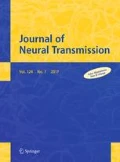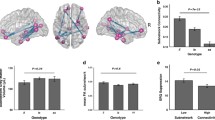Summary.
The tryptophan hydroxylase-2 gene (TPH2) codes for the enzyme of serotonin (5-HT) synthesis in the brain and variation of TPH2 has been implicated in disorders of emotion regulation. Here, we used functional magnetic resonance imaging (fMRI) to demonstrate that a potentially functional variant of TPH2 modulates amygdala responsiveness to emotional stimuli of both negative and positive valence.
Similar content being viewed by others
References
SM Brown E Peet SB Manuck DE Williamson RE Dahl RE Ferrell AR Hariri (2005) ArticleTitleA regulatory variant of the human tryptophan hydroxylase-2 gene biases amygdala reactivity. Mol Psychiatry 10 884–888 Occurrence Handle10.1038/sj.mp.4001716 Occurrence Handle16044172
Canli T, Amin Z, Constable RT, Lesch KP (2005a) Evidence for molecular heterosis in cognition (submitted)
T Canli RE Cooney P Goldin M Shah H Sivers ME Thomason S Whitfield-Gabrieli JD Gabrieli IH Gotlib (2005b) ArticleTitleAmygdala reactivity to emotional faces predicts improvement in major depression. Neuroreport 16 1267–1270 Occurrence Handle10.1097/01.wnr.0000174407.09515.cc
T Canli K Omura BW Haas A Fallgatter RT Constable KP Lesch (2005c) ArticleTitleBeyond affect: a role for genetic variation of the serotonin transporter in neural activation during a cognitive attention task. Proc Natl Acad Sci USA 102 12224–12229 Occurrence Handle10.1073/pnas.0503880102
T Canli H Sivers SL Whitfield IH Gotlib JD Gabrieli (2002) ArticleTitleAmygdala response to happy faces as a function of extraversion. Science 296 2191 Occurrence Handle10.1126/science.1068749 Occurrence Handle12077407
HF Clarke JW Dalley HS Crofts TW Robbins AC Roberts (2004) ArticleTitleCognitive inflexibility after prefrontal serotonin depletion. Science 304 878–880 Occurrence Handle10.1126/science.1094987 Occurrence Handle15131308
R Cools AJ Calder AD Lawrence L Clark E Bullmore TW Robbins (2005) ArticleTitleIndividual differences in threat sensitivity predict serotonergic modulation of amygdala response to fearful faces. Psychopharmacology (Berl) 180 670–679 Occurrence Handle10.1007/s00213-005-2215-5
Costa PT, McCrae RR (1992) Professional manual of the revised NEO Personality Inventory and NEO Five-Factor Inventory. PAR Inc, Odessa, Fl
Friston KJ (1994) Statistical parametric mapping. In: Thatcher R (ed) Functional neuroimaging: technical foundations. Academic Press, San Diego, pp 79–93
AR Hariri EM Drabant KE Munoz BS Kolachana VS Mattay MF Egan DR Weinberger (2005) ArticleTitleA susceptibility gene for affective disorders and the response of the human amygdala. Arch Gen Psychiatry 62 146–152 Occurrence Handle10.1001/archpsyc.62.2.146 Occurrence Handle15699291
M Harvey E Shink M Tremblay B Gagne C Raymond M Labbe DJ Walther M Bader N Barden (2004) ArticleTitleSupport for the involvement of TPH2 gene in affective disorders. Mol Psychiatry 9 980–981 Occurrence Handle10.1038/sj.mp.4001557 Occurrence Handle15263906
A Heinz DF Braus MN Smolka J Wrase I Puls D Hermann S Klein SM Grusser H Flor G Schumann K Mann C Buchel (2005) ArticleTitleAmygdala-prefrontal coupling depends on a genetic variation of the serotonin transporter. Nat Neurosci 8 20–21 Occurrence Handle10.1038/nn1366 Occurrence Handle15592465
Holmes AP, Friston KJ (1998) Generalisability, random effects and population inference. NeuroImage: S754
KP Lesch D Bengel A Heils SZ Sabol BD Greenberg S Petri J Benjamin CR Muller DH Hamer DL Murphy (1996) ArticleTitleAssociation of anxiety-related traits with a polymorphism in the serotonin transporter gene regulatory region. Science 274 1527–1531 Occurrence Handle10.1126/science.274.5292.1527 Occurrence Handle8929413
McNair ML, Lorr M, Droppleman LF (1992) Profile of mood states. EdITS, San Diego, CA
FC Murphy KA Smith PJ Cowen TW Robbins BJ Sahakian (2002) ArticleTitleThe effects of tryptophan depletion on cognitive and affective processing in healthy volunteers. Psychopharmacology (Berl) 163 42–53 Occurrence Handle10.1007/s00213-002-1128-9
L Pezawas A Meyer-Lindenberg EM Drabant BA Verchinski KE Munoz BS Kolachana MF Egan VS Mattay AR Hariri DR Weinberger (2005) ArticleTitle5-HTTLPR polymorphism impacts human cingulate-amygdala interactions: a genetic susceptibility mechanism for depression. Nat Neurosci 8 828–834 Occurrence Handle10.1038/nn1463 Occurrence Handle15880108
WJ Riedel T Klaassen JA Schmitt (2002) ArticleTitleTryptophan, mood, and cognitive function. Brain Behav Immun 16 581–589 Occurrence Handle10.1016/S0889-1591(02)00013-2 Occurrence Handle12401472
A Strobel L Gutknecht Y Zheng A Reif B Brocke KP Lesch (2003) ArticleTitleAllelic variation of serotonin receptor 1A function is associated with anxiety- and depression-related traits. J Neural Transm 110 1445–1453 Occurrence Handle10.1007/s00702-003-0072-0 Occurrence Handle14666415
Walitza S, Renner TJ, Dempfle A, Konrad K, Wewetzer C, Halbach A, Herpertz-Dahlmann B, Remschmidt H, Smidt J, Linder M, Flierl L, Knolker U, Friedel S, Schafer H, Gross C, Hebebrand J, Warnke A, Lesch KP (2005) Transmission disequilibrium of polymorphic variants in the tryptophan hydroxylase-2 gene in attention-deficit/hyperactivity disorder. Mol Psychiatry (in press)
TT Yang V Menon S Eliez C Blasey CD White AJ Reid IH Gotlib AL Reiss (2002) ArticleTitleAmygdalar activation associated with positive and negative facial expressions. Neuroreport 13 1737–1741 Occurrence Handle10.1097/00001756-200210070-00009 Occurrence Handle12395114
P Zill TC Baghai P Zwanzger C Schule D Eser R Rupprecht HJ Moller B Bondy M Ackenheil (2004) ArticleTitleSNP and haplotype analysis of a novel tryptophan hydroxylase isoform (TPH2) gene provide evidence for association with major depression. Mol Psychiatry 9 1030–1036 Occurrence Handle10.1038/sj.mp.4001525 Occurrence Handle15124006
Author information
Authors and Affiliations
Rights and permissions
About this article
Cite this article
Canli, T., Congdon, E., Gutknecht, L. et al. Amygdala responsiveness is modulated by tryptophan hydroxylase-2 gene variation. J Neural Transm 112, 1479–1485 (2005). https://doi.org/10.1007/s00702-005-0391-4
Received:
Accepted:
Issue Date:
DOI: https://doi.org/10.1007/s00702-005-0391-4




